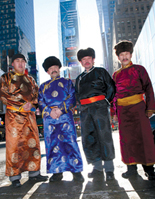| | | |
Archive
| « Fabruary 2008 » |
|---|
| Mo | Tu | We | Th | Fr | Sa | Su |
|---|
| | 1 | 2 | 3 | | 4 | 5 | 6 | 7 | 8 | 9 | 10 | | 11 | 12 | 13 | 14 | 15 | 16 | 17 | | 18 | 19 | 20 | 21 | 22 | 23 | 24 | | 25 | 26 | 27 | 28 | 29 | |
|
| | | |
|
|
|
|
|
|
|
28 Fabruary 2008 | Views: 4232 | Comments: 0 |
|
|
 If you like the sound of flute, it’s like flute but with your body,” says Sayan Bapa, a member of the Tuvan folk ensemble Huun-Huur-Tu, when Feedback asks him how he would describe Tuvan overtone singing for someone who has never heard it. We think that’s an apt description for the style, which involves creating multiple notes at once by manipulating the mouth, throat and vocal chords. You can’t really grasp what it really sounds like without hearing it for yourself, though. We remember our first experience: a rumbling, guttural Hhhhhhhmmmmmmmeeerrrrrrrrrraaaaaaaahhhhh emanated from our roommate’s bedroom, where he was teaching himself the vocal technique, also called throat singing, from resources on the Internet. If you like the sound of flute, it’s like flute but with your body,” says Sayan Bapa, a member of the Tuvan folk ensemble Huun-Huur-Tu, when Feedback asks him how he would describe Tuvan overtone singing for someone who has never heard it. We think that’s an apt description for the style, which involves creating multiple notes at once by manipulating the mouth, throat and vocal chords. You can’t really grasp what it really sounds like without hearing it for yourself, though. We remember our first experience: a rumbling, guttural Hhhhhhhmmmmmmmeeerrrrrrrrrraaaaaaaahhhhh emanated from our roommate’s bedroom, where he was teaching himself the vocal technique, also called throat singing, from resources on the Internet.
|
|
|
|
|
|
John Ruscher, c-ville.com |
|
|
|
|
|
|
